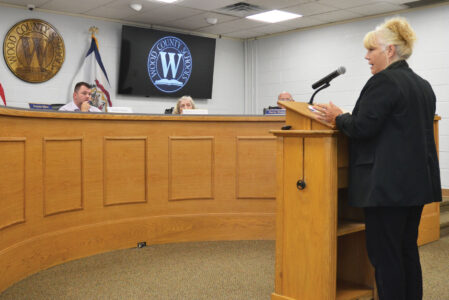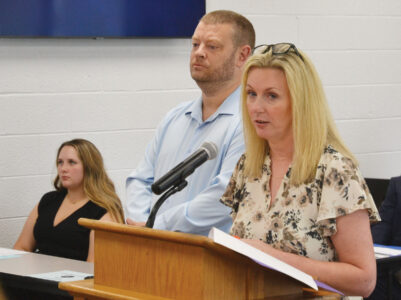Wood County BOE hears about scoreboard, device policy
High School After School program discussed, sick day policy questioned
- Heather Grant, director of elementary education, talks to the Wood County Board of Education about electronic device restrictions for the district. She said the policy comes from state legislation setting guidelines on device usage during the school day. (Photo by Douglass Huxley)
- Parkersburg South Assistant Principal Curtis Garretson, left, and Principal Maria Francisco speak to the Wood County Board of Education Tuesday night about the High School After School program that helps students with and without disciplinary issues achieve their goals of academic success. (Photo by Douglass Huxley)
- Eddie Perine, a bus operator, addresses the Wood County Board of Education Tuesday night about policies that allow some employees to trade in unused sick days toward retirement while others cannot. Board members said that was a state policy they did not agree with. (Photo by Douglass Huxley)
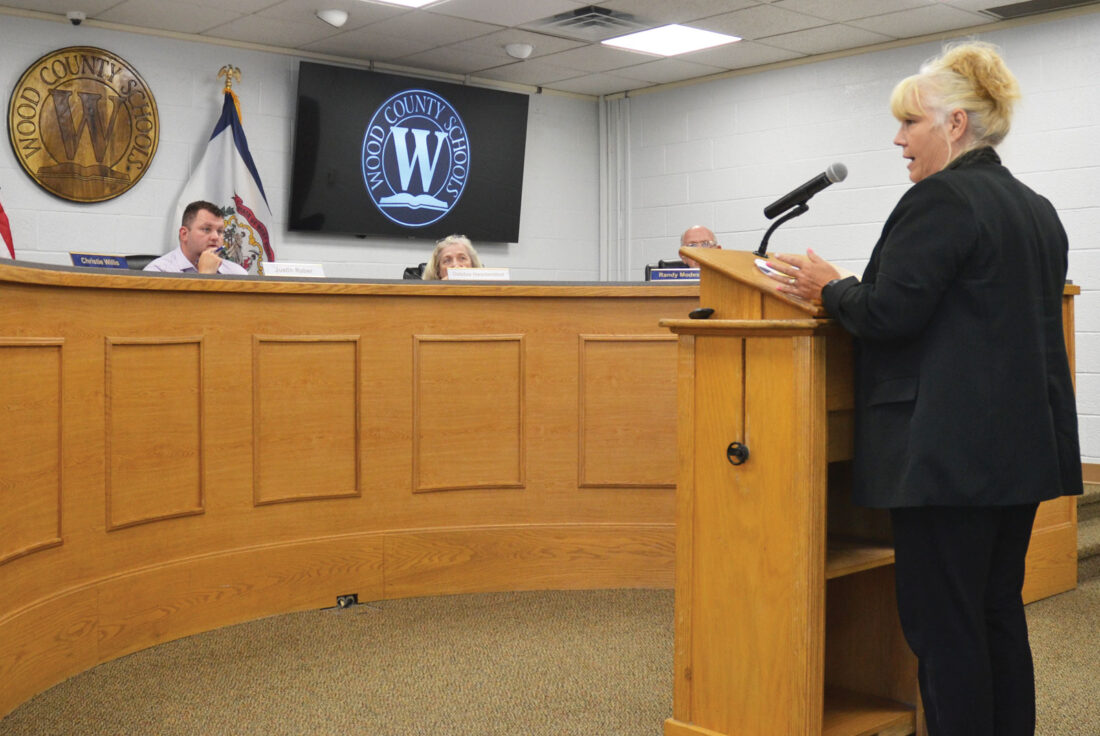
Heather Grant, director of elementary education, talks to the Wood County Board of Education about electronic device restrictions for the district. She said the policy comes from state legislation setting guidelines on device usage during the school day. (Photo by Douglass Huxley)
PARKERSBURG — The Wood County Board of Education heard Tuesday night about a new scoreboard at Parkersburg High School’s Stadium Field and a new policy for restrictions on phones and other electronic devices.
Parkersburg and Parkersburg South High School principals discussed the impact of the High School After School program, and a bus operator questioned a disparity in policies that allow some employees to trade in unused sick days toward their retirement, but not others.
New Scoreboard
PHS Stadium Committee President Pat McFarland and committee board member Tim Kaufman announced the installation of a new state-of-the-art digital scoreboard at Stadium Field, saying the project, supported by Phoenix Construction and other partners, is set to be completed before Aug. 15, just in time for the PHS ice cream social and the first soccer game of the season.
McFarland said the new scoreboard is more than just an upgrade for sporting events and the plan is to have students learn and use the new tool for their educational needs.
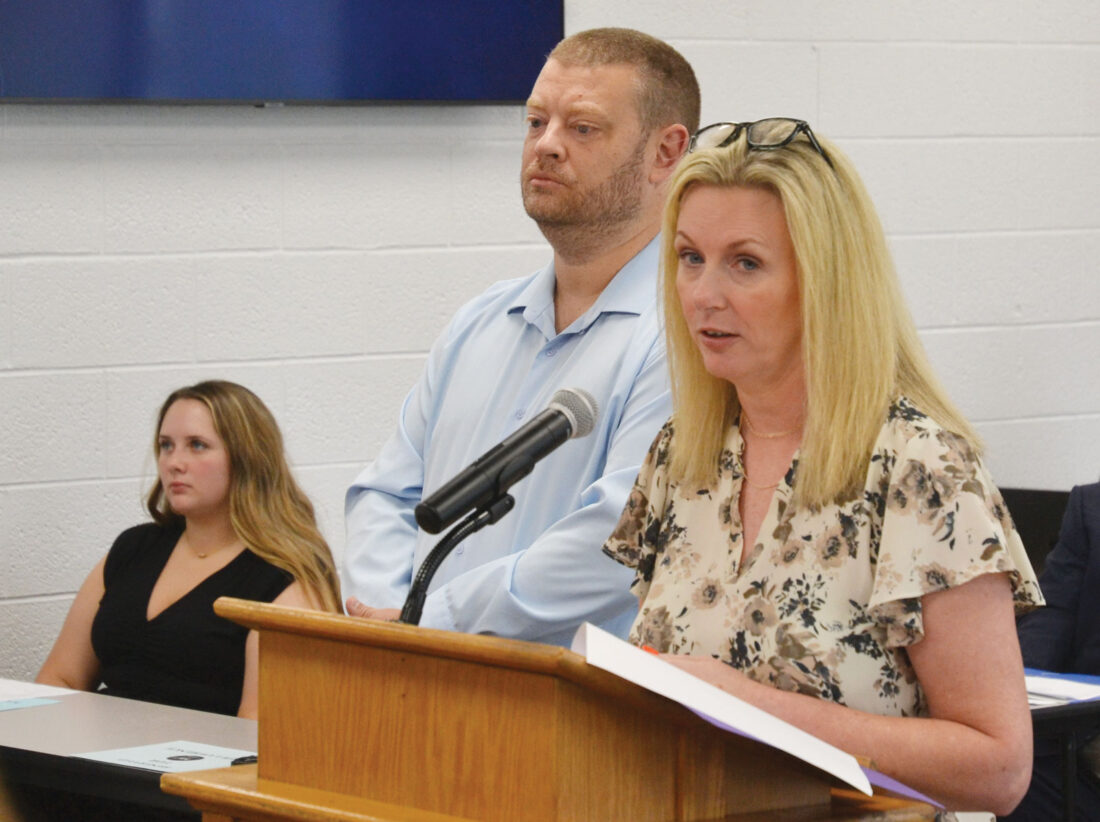
Parkersburg South Assistant Principal Curtis Garretson, left, and Principal Maria Francisco speak to the Wood County Board of Education Tuesday night about the High School After School program that helps students with and without disciplinary issues achieve their goals of academic success. (Photo by Douglass Huxley)
“There is an audio-visual curriculum that has been developed, through the high schools, but the manufacturer is also helping develop a program,” McFarland said. “What we’re hoping to do, and what the plan is, is to have students prepare most of the displays and things like that, so they can get some real world experience before they head into college or go into trade school.”
McFarland said the scoreboard improvements are expected to benefit not just high school students, but the entire community.
“We prepared some numbers and did some surveys. And the middle schools and the junior highs come in, the pee wee leagues come in, the different number of events for the middle school and grade school track events,” McFarland shared. “It’s not just football, you know, there’s soccer, there’s band, there’s all kinds of other things for the kids to do. And it’s not just the high school kids. Hopefully we can have some impact on every child in the county, and that’s our goal.”
Board President Justin Raber praised their efforts.
“It truly takes everyone, and there’s a fantastic base of support at PHS, which I don’t think could ever be replicated anywhere,” he said.
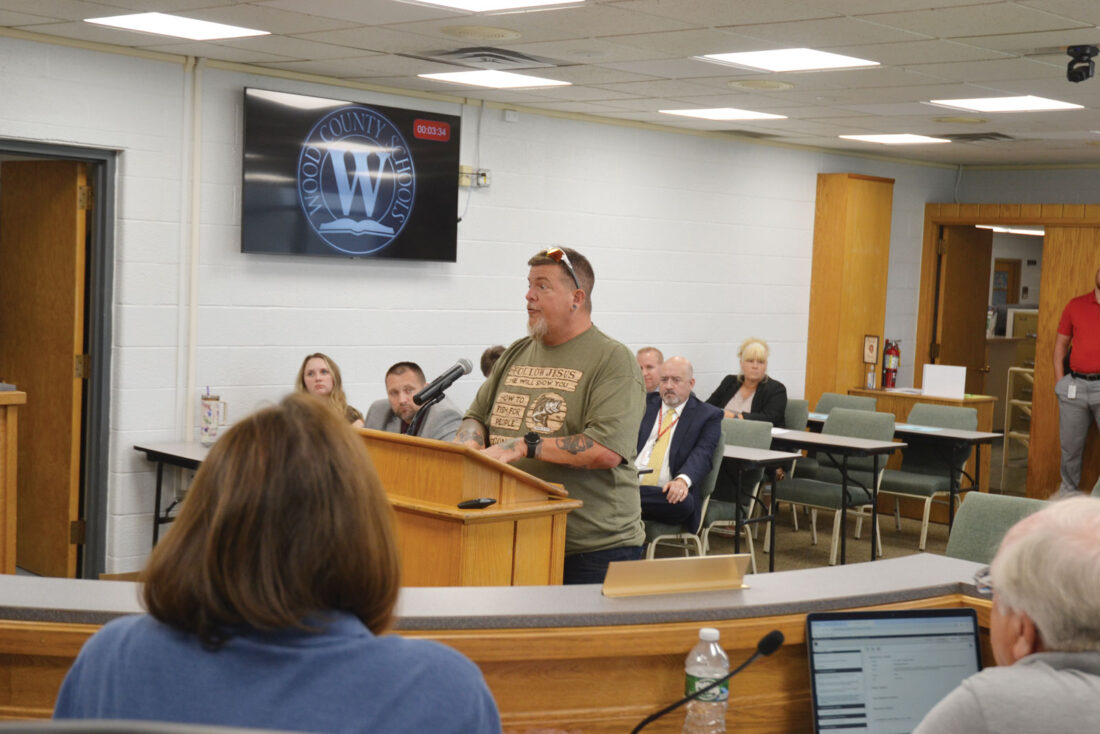
Eddie Perine, a bus operator, addresses the Wood County Board of Education Tuesday night about policies that allow some employees to trade in unused sick days toward retirement while others cannot. Board members said that was a state policy they did not agree with. (Photo by Douglass Huxley)
High School After School
PHS Principal Jason Potts and Parkersburg South Principal Maria Francisco and Assistant Principal Curtis Garretson talked to the board about the High School After School program and the positive impact it’s having on students who face a variety of challenges getting their work done during the normal academic day.
“Our goal in this program is to provide intervention, and that intervention piece is very important to help students graduate,” Potts said. “The program itself … has impacted our students for tutoring after school, to have someone that will have all of the core subjects there.”
This year, 82 students participated in the after-school program for a variety of reasons, including discipline, academic support and personal choice. Of those, 47 were placed for discipline reasons, with the remainder seeking help to improve their grades or recover credits. Francisco said while discipline and attendance issues are a major reason for enrollment there are many contributing factors for why students take part in the program. It provides an alternative for those students who struggle with traditional school settings, offering a structured environment to address behavioral and attendance concerns but also helps those that might be struggling with changing family dynamics and economic pressures.
“We had 33% of our students this year that were attending because of other reasons besides discipline,” she said. “We are seeing an increase, an unfortunate increase, of students being one of the primary breadwinners for their households, or having to, at the very least, take care of themselves. The night school program allows them to work during the day and come to school at night, and that’s just invaluable to them.”
Board member Judy Johnson said this program was important to her as she taught night school for seven years at Jefferson Elementary. She said some students thrive better in that environment.
“I had a student that told me he could only go at night because he paid the rent for his parents,” Johnson said. “We have a variety of things that we do at the night school, and I hate that it’s just associated with discipline. Hopefully this will dispel that.”
Electronic Device Restrictions
Heather Grant, director of elementary education, and Justin Hartshorn, assistant superintendent of academics and leadership, presented proposed updates to the district’s electronic device policy, highlighting changes aimed at supporting student success and streamlining procedures across all school levels.
“We want to set our students up to be successful when they go to college, when they go to trade school or when they go to a job. We want to get them in those habits that you can check your phone before, at lunch and after,” Grant said. “So we thought, why not try to start setting them up with those habits now?”
She said a significant change allows high school students to use their phones during their assigned lunch period, while middle school students will continue to store devices in lockers throughout the day. The policy also clarifies that “school-issue devices were exempt from this policy.”
Grant said parents can contact the main office if they need to get a message to their child
“And messages will promptly be relayed to the students at the earliest appropriate opportunity that does not interrupt instruction,” she said.
The pair also addressed disciplinary procedures for policy violations.
“The first offense will be the same. The teacher or principal will take possession of the phone, the parents will be notified, and the phone will be returned to the child at the end of the day, and the offense will be documented,” Hartshorn said. “The phone will remain locked in the office, and the students, parents and guardians must pick up the device in the office.”
Johnson said the policy is not a local decision, but a legislative mandate and she knows it’s going to be difficult for some families.
“We’re just following what our Legislature says we have to; we can’t make it less than what they say. We have to make it equal or more strict than what they say,” Grant said.
She said the updated policy aims to balance student responsibility, safety and effective communication, coming from input given by administrators, board members and the community.
The proposed policy will be up for the public to view and comment on on the district’s website.
Sick Day Policy
Bus operator Eddie Perine talked to the board about a policy that allows some employees to trade in unused sick days towards retirement while others cannot.
“There was a new contract that came into effect, where the older people with that older contract, they could save up days, sick days, and buy days, and that way they could retire early, or they can buy years. I know somebody that has 400 days and he plans on buying four years of service,” Perine said. “It’s really frustrating as an employee to know that it doesn’t matter what you do … there’s really no benefit except working for this great county. … I want to be treated fairly like everybody else… I want to be able to come and build up my sick days if I want to.”
Raber said he supports Perine in his quest to be treated fairly but there isn’t much the district could do.
“You’re not going to find a school board in this state that does not support exactly what you’re saying,” Raber said. “The issue is, Charleston is our Legislature, and (the district) would do it in a heartbeat, but the laws in the state of West Virginia don’t allow this,”
He encouraged Perine and other employees to advocate for change.
“There are legislators that are in favor of it, but at the end of the day, they have to be pushed and told by the people they work for to make positive change,” Raber said/
He said the Legislature doesn’t have the authority to take away what the older employees now have, but they do have the power to give those benefits to all employees.
“So what you and every one of your coworkers needs to do is beat down the doors of every one of our legislators. Do not let them go,” Raber said.
The board will meet next Tuesday at the Caperton Center for personnel matters and to take a tour of the facility after taking it over from WVUP early this month. The meeting is open to the public and will be streamed online.
Douglass Huxley can be reached at dhuxley@newsandsentnel.com.

